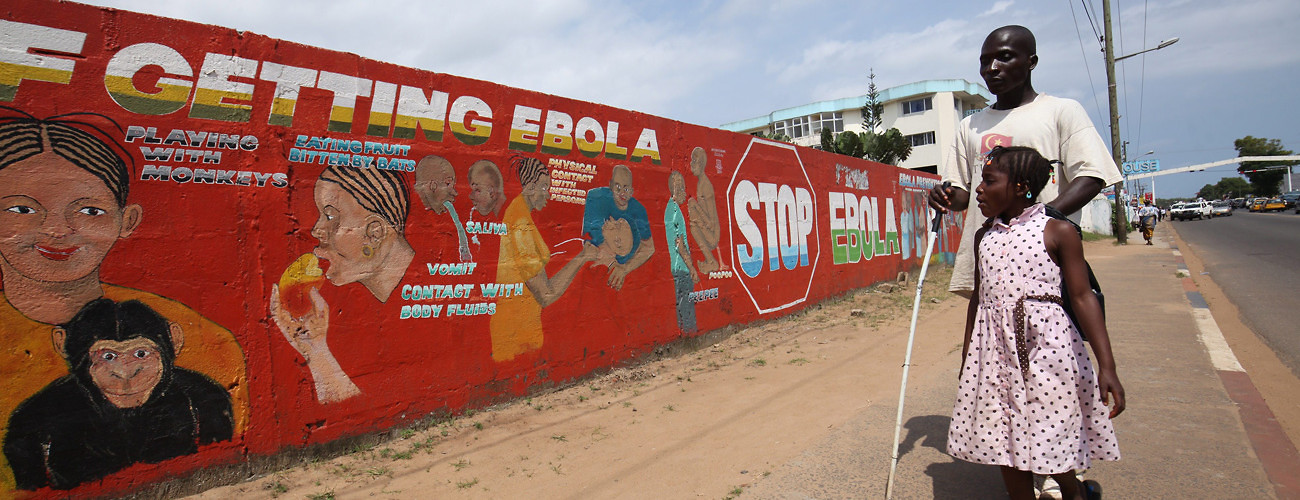A father and child walk past an advisory mural about the Ebola virus. Monrovia, Liberia, August 1, 2015. (Ahmed Jallanzo/EPA/Corbis)
After the death of over 11,000 people, and a year of intense remedial efforts, the global response to Ebola in West Africa is shifting from emergency to recovery mode. This follows the successes in containing the spread of the virus in the region, and the possibility of “getting to zero and staying zero,” as recently demonstrated by Liberia.
As part of the recovery process, United Nations Secretary-General Ban Ki-moon hosted an international Ebola Recovery Conference in New York in July, to focus attention on the need for targeted investments to support recovery priorities over a 24-month time frame.
The three countries most heavily affected by the recent outbreak—Liberia, Sierra Leone, and Guinea—presented their suggested national recovery plans, indicating specific priorities and budget requirements. They also provided a coordinated regional recovery plan, with the Mano River Union (MRU) providing the framework for action.
The recovery plan contains many worthwhile outcomes designed to mitigate the social, economic, financial, governance, and security impact of the Ebola outbreak. Specific areas targeted include health care, water and sanitation systems, education, gender, youth and social protection, agriculture, trade, food security, infrastructure, budget, debt and security.
There are, however, significant limitations to the choice of MRU in this role. The Economic Community of West African States (ECOWAS) would provide a much better framework.
To begin with, the four member states of MRU—completed by Cote d’Ivoire—are already part of ECOWAS, which has 15 members in total. The objectives of the MRU and ECOWAS are also similar. They include the promotion of economic cooperation and integration, peace and security, and social development.
ECOWAS is, however, more advanced in the attainment of these objectives. It is also better equipped and resourced than the MRU. All the member states of the MRU have at one time been assisted by ECOWAS to solve their internal problems. The Ebola epidemic would be another case in point.
It is important to note that ECOWAS was the first organization in the world to respond to the Ebola crisis in a coordinated manner. It was first to declare Ebola a regional security threat in March 2014. It also initiated a series of high-level meetings and consultations to assist the affected states through its health agency, the West African Health Organization (WAHO).
WAHO dispatched a series of recommendations on measures to be taken by all the 15 member states in the face of Ebola outbreak. Furthermore, ECOWAS already has a dedicated Ebola response plan, which established ad hoc regional bodies charged with its implementation. These consist of the Coordinating Ministerial Group and the Technical Monitoring and Surveillance Group.
Through its response plan, ECOWAS trained national health workers of the affected states on disease surveillance and kept member states informed of the regional spread of the disease. It facilitated the provision of financial support to the member states, as well as the establishment of a regional plan of action against Ebola, and a solidarity fund.
Ebola is not confined to the MRU area, and ECOWAS has been actively involved in providing regional leadership. It has utilized its convening political advantage to organize high-level meeting of heads of states or ministers of all the 15 states to support the process. This includes leaders adopted a regional approach to fighting Ebola at a summit in July 2014.
Through WAHO, ECOWAS already has a regional health structure with experience of regular engagements with states on a range of health issues. MRU has no such administrative and technical structure. It is therefore more cost-effective to utilize the existing ECOWAS framework.
ECOWAS can mobilize financial and technical resources to help in the recovery process of the affected states. It has already deployed health workers drawn from other states, trained health workers in the affected states, and established a regional solidarity fund that has thus far disbursed about 5 million USD.
The regional body has also utilized the best practice example of Nigeria as an Ebola survivor to assist the affected states. The response of Africa’s most populous nation to the 2014 outbreak was considered a “spectacular success story,” and included a quick mobilization of existing medical capacities designed to combat polio.
The ability to draw on wider regional resources to implement the regional plan holds better promise than what the MRU can provide. Under the alternative scenario, the thin resources of the affected states will already be stretched by the need to implement the national recovery plans, leaving little to contribute to implementation of the MRU vision.
ECOWAS can also offer better coordination of international assistance. It has already worked with the UN, African Union, and African Development Bank on Ebola, and was at one point requested by the WHO to lead the international response process to the disease. Furthermore, ECOWAS has developed regional frameworks that can support the economic, fiscal, and financial recovery of affected states. For example, the Tripartite Meeting on West Africa Integration brings together the World Bank Group, ECOWAS, and the West African Economic and Monetary Union to help the socioeconomic development of the sub region.
Implementing the regional Ebola recovery plan through ECOWAS will better establish a more expansive preparedness in the region. It will also strengthen ECOWAS as regional building bloc of the AU, enhance the principle of subsidiarity, and advance the economic integration of the region.
Aside from financial assistance, Ebola recovery will require health personnel, teachers, entrepreneurs, investors, and peace and security experts to assist the most affected states. ECOWAS can provide these resources by drawing them from its other 12 member states. The MRU, on the other hand, does not have such advantages.
Bappah Habibu Yaya is a Fellow of the African Leadership Centre, Kings College London, and an academic staff member of the Department of Political Science/International Studies, Ahmadu Bello University Zaria, Nigeria.





